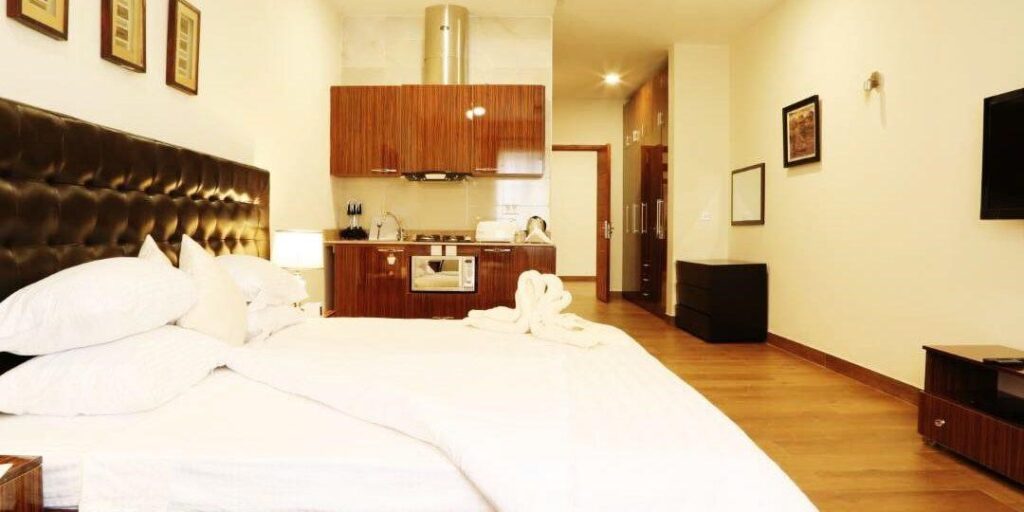Vacation Homes: The Ultimate Guide to Finding Your Dream Getaway
Vacation homes have become increasingly popular over the years, offering a unique opportunity for people to escape the hustle and bustle of their everyday lives. These homes are typically located in scenic areas, such as near the beach or in the mountains, and provide a peaceful retreat for individuals and families alike.
One of the main benefits of owning a vacation home is the ability to have a home away from home. This means that individuals can enjoy the comforts of a familiar space while also exploring new surroundings. Vacation homes also provide a sense of privacy and seclusion that is often difficult to find in hotels or other accommodations.
However, owning a vacation home also comes with its own set of challenges. Maintenance and upkeep can be costly and time-consuming, and the home may sit vacant for long periods of time. Additionally, the cost of purchasing a vacation home can be significant, making it a major investment for many individuals. Despite these challenges, many people continue to see the value in owning a vacation home and the benefits it can provide.
Read More: Affordable Real Estate Investment: Tips and Strategies for Beginners
Types of Vacation Homes
When it comes to vacation homes, there are many options available to suit different preferences and budgets. Here are some of the most popular types of vacation homes:
Beach Houses
Beach houses are a popular choice for those who love the sun, sand, and sea. They are typically located near the beach and offer stunning ocean views. Beach houses come in a variety of sizes, from cozy cottages to spacious villas. Many beach houses feature outdoor spaces such as decks or patios, perfect for enjoying the ocean breeze.
Mountain Cabins
Mountain cabins are ideal for those who love the great outdoors and want to escape the hustle and bustle of the city. These cozy cabins are typically located in scenic mountain areas and offer breathtaking views of the surrounding landscape. Many mountain cabins feature wood-burning fireplaces, perfect for snuggling up on chilly evenings.
Resort Condos
Resort condos are a great option for those who want to enjoy the amenities of a resort while still having the privacy of their own space. These condos are typically located within a resort complex and offer access to amenities such as pools, spas, and restaurants. Resort condos come in a variety of sizes and styles, from cozy studios to spacious multi-bedroom units.
Country Cottages
Country cottages are perfect for those who want to experience the charm of rural living. These quaint cottages are typically located in scenic countryside areas and offer a peaceful retreat from the hustle and bustle of the city. Many country cottages feature gardens or outdoor spaces, perfect for enjoying the fresh air and natural beauty of the surrounding area.
Overall, there are many different types of vacation homes to choose from, each offering its own unique benefits and features. Whether you prefer the beach, the mountains, a resort, or the countryside, there is a vacation home out there that is perfect for you.
Investing in Vacation Homes
Investing in vacation homes can be a profitable venture for those looking to diversify their investment portfolio. Vacation homes offer the potential for rental income, appreciation, and personal use. However, before investing in a vacation home, it’s important to do a thorough market analysis, consider financing options, and evaluate the rental income potential.
Market Analysis
Before investing in a vacation home, it’s important to research the local real estate market. Factors such as location, proximity to attractions, and seasonality can all impact the demand for vacation rentals. It’s also important to consider the competition in the area and the rental rates for similar properties. By conducting a market analysis, investors can make informed decisions about where to invest and what types of properties to purchase.
Financing Options
Financing a vacation home can be more challenging than financing a primary residence. Lenders often have stricter requirements for vacation home loans, such as higher down payments and credit scores. However, there are a variety of financing options available, including traditional mortgages, home equity loans, and cash-out refinancing. It’s important to shop around and compare rates and terms to find the best financing option for your investment.
Rental Income Potential
One of the main benefits of investing in a vacation home is the potential for rental income. Investors can rent out the property on a short-term basis to vacationers and earn income to offset the cost of the property. However, it’s important to consider the expenses associated with owning a vacation rental, such as property management fees, maintenance costs, and marketing expenses. Investors should also be aware of any local regulations and taxes related to vacation rentals.
Overall, investing in vacation homes can be a smart financial decision for those willing to do their research and carefully evaluate the potential risks and rewards. By conducting a thorough market analysis, considering financing options, and evaluating the rental income potential, investors can make informed decisions about where to invest and how to maximize their returns.
Location Considerations
When choosing a vacation home, the location is a crucial factor to consider. Here are some location considerations to keep in mind:
Accessibility
It is important to choose a vacation home that is easily accessible. Consider the distance from the nearest airport, train station, or major highway. If you plan on driving, make sure the roads leading to the vacation home are well-maintained and easily navigable. If you have any mobility issues, consider a vacation home that is wheelchair accessible.
Local Attractions
The location of your vacation home should be close to local attractions that interest you. Whether you enjoy hiking, skiing, or sightseeing, make sure the vacation home is in close proximity to the activities you want to do. Check out local restaurants, shops, and entertainment options as well.
Climate and Weather
The climate and weather of the location should also be taken into consideration. If you prefer warm weather, consider a vacation home in a tropical location. If you enjoy cooler temperatures, consider a vacation home in a mountainous region. Be sure to research the weather patterns and seasons of the location to ensure you are choosing the best time of year to visit.
Overall, choosing the right location for your vacation home is crucial for a successful and enjoyable trip. By considering accessibility, local attractions, and climate and weather, you can find the perfect vacation home to suit your needs.
Design and Amenities
Interior Design
Vacation homes are designed with the utmost care and attention to detail. The interiors are typically decorated with high-end furnishings, luxurious fabrics, and tasteful decor. The design of the vacation home is intended to create a comfortable and relaxing environment for guests to enjoy.
Luxury Features
Vacation homes often come equipped with a range of luxury features, such as a private pool, hot tub, and outdoor kitchen. These features are designed to provide guests with a luxurious and relaxing experience during their stay. Other luxury features may include a home theater, game room, and fitness center.
Smart Home Technologies
Many vacation homes are equipped with smart home technologies that allow guests to control various aspects of the home using their smartphone or tablet. These technologies can include lighting, temperature control, and security systems. Guests can also use these technologies to access entertainment options, such as streaming services and music.
Overall, vacation homes are designed to provide guests with a luxurious and comfortable experience. The design and amenities of these homes are carefully chosen to create a relaxing and enjoyable environment for guests to enjoy.
Legal and Regulatory Issues
Zoning Laws
When it comes to purchasing a vacation home, it’s important to consider the local zoning laws. Zoning laws regulate the use of land and buildings in specific areas, and they can vary greatly from one location to another. Some areas may have strict zoning laws that limit the use of vacation homes, while others may be more lenient.
Before purchasing a vacation home, it’s important to research the zoning laws in the area. This can be done by contacting the local zoning board or consulting with a real estate attorney. It’s also important to consider any future changes to zoning laws that may affect the use of the vacation home.
Tax Implications
Owning a vacation home can have significant tax implications. The tax laws surrounding vacation homes can be complex, and it’s important to understand the potential tax consequences before making a purchase.
One important consideration is the tax treatment of rental income. If the vacation home is rented out for part of the year, the rental income may be subject to federal and state income taxes. Additionally, expenses related to the vacation home, such as mortgage interest and property taxes, may be deductible on the owner’s tax return.
Rental Regulations
Many areas have regulations governing the rental of vacation homes. These regulations can include requirements for permits, inspections, and taxes. It’s important to research the rental regulations in the area before purchasing a vacation home with the intention of renting it out.
Some areas may also have restrictions on the number of days that a vacation home can be rented out each year. Owners should be aware of these restrictions and ensure that they comply with all applicable regulations.
Overall, it’s important to carefully consider the legal and regulatory issues surrounding vacation home ownership before making a purchase. By doing so, owners can avoid potential legal and financial issues down the road.
Maintenance and Upkeep
Regular Cleaning
Vacation homes require regular cleaning to maintain their quality and appearance. It is recommended to clean the property after every stay, which includes vacuuming, mopping, dusting, and sanitizing all surfaces. The cleaning should also involve checking for any damages or repairs needed.
Seasonal Repairs
Seasonal repairs are necessary to ensure that the vacation home is in top condition for guests. This includes checking for any damages caused by weather changes, such as leaks or cracks. The property owner should also inspect the HVAC system, plumbing, and electrical systems to ensure they are functioning correctly.
Emergency Services
In case of any emergency, vacation homeowners should have a plan in place to address the situation. This includes having a list of emergency contacts, such as local repair services, plumbers, electricians, and HVAC technicians. The property owner should also have a backup plan in case of power outages or natural disasters.
Overall, maintenance and upkeep are essential for the longevity and quality of vacation homes. By implementing regular cleaning, seasonal repairs, and emergency services, property owners can ensure that their guests have a safe and enjoyable stay.
Marketing Your Vacation Home
Online Platforms
One of the most effective ways to market your vacation home is by listing it on online platforms. These platforms allow you to reach a wider audience and increase your chances of finding potential renters. Some popular online platforms for vacation rentals include Airbnb, VRBO, and HomeAway. When creating your listing, make sure to include detailed descriptions, high-quality photos, and competitive pricing to attract potential guests.
Professional Photography
High-quality photos are essential when marketing your vacation home. Consider hiring a professional photographer to capture the best features of your property. Professional photos can make your vacation home stand out from the competition and increase the likelihood of bookings. Additionally, make sure to showcase unique features of your vacation home, such as a pool or scenic views, to attract potential renters.
Guest Services
Providing exceptional guest services can help increase positive reviews and attract repeat renters. Make sure to communicate clearly with guests before and during their stay to ensure a smooth experience. Consider providing amenities such as a welcome basket, local recommendations, and 24/7 support to make guests feel comfortable and valued. Positive reviews and word-of-mouth recommendations can go a long way in marketing your vacation home.
Remember, marketing your vacation home effectively requires attention to detail and a willingness to go above and beyond for your guests. By utilizing online platforms, professional photography, and exceptional guest services, you can increase the visibility of your vacation home and attract potential renters.
Security Measures
Alarm Systems
When it comes to vacation homes, security is a top priority. One way to ensure the safety of your property is by installing an alarm system. Most modern vacation homes come equipped with an alarm system that can be activated and deactivated remotely. This ensures that the property is secure when not in use. In addition, some alarm systems come with motion detectors, which can alert the homeowner or property manager if there is any unusual activity on the property.
Insurance Coverage
Another important security measure is insurance coverage. It is essential to have adequate insurance coverage for your vacation home to protect against any unforeseen events such as theft, fire, or natural disasters. Homeowners should check with their insurance providers to ensure that their vacation home is covered under their policy. In addition, it is recommended to have liability coverage in case of any accidents or injuries that may occur on the property.
Local Property Management
Having a local property management company is also a great security measure for vacation homes. Property management companies can provide regular inspections of the property to ensure that everything is in good working order. They can also provide emergency services if needed, such as plumbing or electrical repairs. In addition, property management companies can provide security services, such as monitoring the property for any unusual activity and responding to any emergencies.
Overall, vacation homeowners should take security measures seriously to ensure the safety of their property. By installing an alarm system, having adequate insurance coverage, and using a local property management company, homeowners can have peace of mind knowing that their vacation home is secure.



